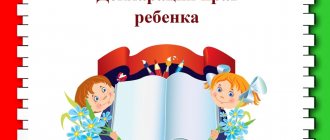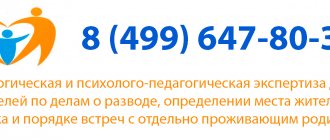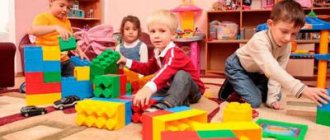Contents of the Declaration
The main provision of the adopted Declaration was that “humanity is obliged to give the child the best that it has.” The document proclaimed 10 social and legal principles relating to the protection and well-being of children at the international level.
For the first time, it was noted that caring for children and their protection are more the exclusive responsibility of the family and even of an individual state. All humanity must care about protecting the rights of children.
The developers of the Declaration determined the responsibility of persons who should provide, teach, and educate minors, but do not do so. The 10 principles reflect the main responsibilities of adults to children.
1st principle
. All children have equal rights with their peers, which cannot be infringed, reduced or abolished altogether.
2nd principle
. Every child has the right to his own dignity and the opportunity to develop morally, physically and spiritually.
3rd principle
. The state is obliged to provide children living on its territory with citizenship, and parents are obliged to give them a name.
4th principle
. Children have the right to social care and medical support, which should be provided to their mother during pregnancy and the postpartum period. Every child has the right to housing and food. The Declaration characterizes school age in great detail. In addition, the need for constant monitoring of the condition of children, especially from disadvantaged families, is explained.
5th principle
Children with disabilities (physically or mentally) must be provided with special care and attention
6th principle
. Every child has the right to love from his parents and the state of which he is a citizen.
7th principle
. All children are provided with free education. They have the right to play and develop. Parents must teach them responsibility and usefulness to their society.
8th principle
. The rights of the child are defined as paramount in the ability to receive help.
9th principle
. The Declaration protects children from abuse and exploitation. The child should not be involved in work that is harmful to his development and emotional stability. Force should not be used on children.
10th principle
. Every child has the right to a peaceful life in which adults, in particular parents, teach him care and mutual understanding.
Child protection
Thus, in Geneva in 1924, the first declaration of the rights of the child appeared. Its summary consists of a description of the five main principles that protected children from slavery, prostitution and trafficking. This was a significant breakthrough in global legislation, but other protection for minors was also required. The UN General Assembly finalized the existing Geneva document and adopted its new version.
In the new Declaration of 1959, the rights of the child were recorded in a more complete form. Its developers determined the responsibility of persons who should provide, teach, and educate minors, but do not do so.
The 10 principles of the Declaration of the Rights of the Child highlight the responsibilities of adults to children. In short, all the best things on Earth belong to children and teenagers and cannot be taken away from them at someone’s whim.
Summary of the 10 principles
Ten principles of the Declaration:
The first principle gives equal rights to those of the same age, regardless of skin color, social status, place of birth and residence. All children must be provided with proper education, as well as the necessary physical development. They must have their first and last name and citizenship of their country of residence. There is an opportunity to receive medical care and social care even before birth (during the prenatal and entire postpartum period). Little citizens should always have a home and food
This principle pays much attention to schoolchildren; it points to the obligation to monitor their health, especially in families with low material income, and to provide them with social security. The purpose of such enhanced care is to prevent pathological tendencies of adolescents (suicide, sadism, vagrancy, drug addiction). Children with mental and physical health problems are under increased attention and care of those responsible for them. All minors have the right to be loved and receive guardianship from their parents.
In case of their absence, the family will be provided for by the state in which they live. The right to free education on the basis of Federal Law No. 273 and the Constitution. Parents are obliged to provide such an opportunity in order to raise a citizen useful to society. In addition to learning, knowledge of the world around us is carried out through games, books, and cartoons. An important principle of the Declaration is to protect against abuse and exploitation of minors. Cruel treatment in the form of mental, physical, and sexual violence cannot be used! Acceptable methods of education are explanations, persuasion, and persuasion. Cases of harshness are punished by law, and strict penalties are provided in cases of violation of the rights of the child. The following are considered violent: threats, rudeness, corporal punishment, humiliation of dignity, injuries to the body and psyche. He has the primary right to receive help from adults and the state if he needs it. All people have the right to a life without aggression and war, a peaceful sky above their heads.
Briefly about the 10 principles of the Declaration of the Rights of the Child and responsibility for their violation
Rule 7. Every minor has the right to study for free. This thesis of the UN Declaration states that the primary level of education should be accessible and free for every child. Children should be provided with opportunities for play and entertainment that are consistent with educational goals. Parents, in turn, must teach their children to be responsible and useful to society.
We recommend reading: Lived in the Chernobyl zone
Rule 5. If a child is disabled, he is still a member of society and, like other children, has all the above rights. Such babies require special attention and care. According to this principle of the Declaration, the state must provide them with special educational programs.
Basic principles
The Declaration on the Rights of Minors contains ten basic principles:
All minors should have equal rights regardless of any circumstances, for example: gender, race, religion, etc. Such equality should be supported and protected by the laws of all countries. All children have the right to moral and physical self-development. No one has the right to embarrass their dignity. Children have the right to receive citizenship of the country in which they were born and the name given by their parents. Parents or guardians must take steps to register and receive documents for the newborn child. All children have the right to health and social services from birth. Medical services also include monitoring the child’s mental state
A physically or mentally handicapped child, no matter whether he was born this way or became this way during his lifetime, should be provided with both psychological and material assistance. A child should be surrounded by the love and care of his parents, regardless of his citizenship
And also care should be shown on the part of the state in which the minor lives. Children have the right to develop and learn. For this reason, any government must ensure that they are able to obtain free education. Parents are required to organize training. The child comes first. Providing assistance to a minor in any situation is a priority. The right of minors to immunity from elders. Children must be protected from cruelty in its various forms. The educational process should be carried out using methods of persuasion and explanation. Every child should have the right to a peaceful life. Children should not be instilled with a feeling of hostility towards other races or people of other social groups. Everything should be based on humanity and mutual understanding towards the people around us.
History of the Declaration and its definition
The International Declaration of the Rights of Children is an official document adopted by the international community, which sets out the responsibilities of an adult towards a child.
The first version of the Declaration was adopted in 1924. It consisted of five main points and provided for the protection of children from prostitution, trafficking and slavery. For the UN, this was a major advance in the transformation of international laws. But still minors needed more protection. Later, some improvements and changes were made to the Declaration.
The revised Declaration came into force in 1959. In the new version, there were more main points that protected the rights of children; they already affected many other areas. The measure of liability for violations was also prescribed.
History of the declaration
Due to the minority of children, they are very susceptible to various malicious motives. In the 21st century, it is not uncommon that a child may be insulted or disadvantaged as a person, and therefore society needs to regulate relations at the legal level.
The option of influencing the upbringing of children, as well as their presence in society, began to be considered in the 19th century. Changes in the legislation of that time advocated the protection of children not only from physical violence, but also from slave-holding relations, illegal labor exploitation, the danger of selling children and prostitution.
The issue of regulating children's rights was first raised in Australia in the 19th century. After this event, documents on similar topics began to be created in Canada and the USA. In order for this issue to be taken into account from a legal perspective, special documents were developed.
In 1924, the Declaration was issued in Geneva, which was adopted by the League of Nations and became the very first document regulating the rights of the child. Translated from Latin, “to declare” means to proclaim rights. That is, the safety of children began to obey certain laws. And although this document contained only rules and recommendations, it must be said that this was a significant step in solving the problem of providing the child with comfortable and safe conditions for learning, living, and self-development.
Is it difficult to figure it out on your own?
Try asking your teachers for help
Solving problems Tests Essays
The 1924 Declaration set out the basic five principles that protected children from illegal activities, including labor exploitation, trafficking or prostitution. Despite the document developed, most countries agreed that children require protection of a slightly different order.
For this reason, in 1945, the work of the UN paid considerable attention to regulating the rights of children, as well as their well-being. The General Assembly created the Children's Fund, as well as UNICEF. Help for children around the world depends on the work of this particular mechanism.
Also in 1948, amendments were made to the documentation and it was determined that children were the object of special assistance. The new Declaration was adopted in full in 1959.
How the principles of the Declaration are applied in Russia
Children's rights are spelled out in Russian legislation and are protected. Regardless of the child’s nationality, religion, social status, etc., he has the right to the following:
- life;
- citizenship of the Russian Federation;
- last name, first name and patronymic;
- family and kinship ties;
- upbringing;
- protection of your rights;
- protection of integrity;
- education;
- ;
- recreation and entertainment;
- various types of property;
- expression of personal opinion;
- religion;
- inviolability of property, secrecy of correspondence and telephone conversations;
- support from the state if a minor is orphaned or his parents have been deprived of parental rights;
- decent living conditions.
For violation of the rights of minors in Russia, penalties range from administrative to criminal, depending on the severity of the violation.
The rights of the child apply not only in family relationships, but also in society. Helplines are being created where people can contact in case of violation of children's rights.
Violation and liability
There are also territorial commissions in our country. These organizations interact with each other. They take certain preventive measures against minors. In most cases, the violators are not only the family, but also the preschool institution and school.
They can humiliate, insult, beat children, and often force them to do all the dirty work.
Expert opinion Maria Lokshina Family law expert since 2010
The state provides for the protection of children's rights from despotism and the arbitrariness of adults. We are talking not only about problem parents, but also about educators, teachers, teachers.
Not everyone knows that there is responsibility for violating children's rights. It can be administrative and even criminal.
If a child complains to representatives of the guardianship authorities or the police, then government agencies that are called upon to protect minor citizens of our country will definitely respond to the alarm. If facts confirming illegal actions are revealed, a criminal case will be opened against the violator.
Dear readers, the information in the article may be out of date, take advantage of a free consultation by calling: Moscow +7
, Saint Petersburg
+7 (812) 425-62-38
The most important principles of children's rights under state protection
The rights and interests of children are called upon to be respected by parents, guardianship authorities, the prosecutor's office and the court . There are a lot of nuances in this issue. For example, it is the parents who are the direct representatives of the child , obligated to ensure that the rights of their offspring are not infringed in any way.
But it happens that it is dad and mom who trample on these rights , caring more about their own interests, then the guardianship authorities take the protection of the rights of children into their own hands
Principle 6
For the full and harmonious development of his personality, a child needs love and understanding. He should, whenever possible, grow up under the care and responsibility of his parents and in any case in an atmosphere of love and moral and material security; A young child should not, except in exceptional circumstances, be separated from his mother. Society and public authorities must have a duty to provide special care for children without families and for children without sufficient means of subsistence. It is desirable that large families be provided with state or other child support benefits.
Who will help protect your rights?
Children need protection because they are small and do not have as much knowledge as adults. If violence occurs against a child, he can ask for help by phone or come in person.
He will be helped in the following organizations:
- child protection;
- police;
- children's assistance center;
- various shelters;
- prosecutor's office;
- emergency help for children by phone.
If strangers witness a violation of a child’s rights, they should not ignore such cases. By calling the child care service, there is a chance to save the child from the inhumane attitude of the parents.
GDZ - The world around us, grade 4
Dolphins are not fish, but mammals! There are 3 species of dolphins in the Black Sea, the largest are bottlenose dolphins, they are also the most common inhabitants of dolphinariums. Scientists have been studying dolphins for a long time, some believe that they have intelligence. Experiments and observations show that dolphins have their own language; they call each other by name. The bottlenose dolphin lives up to 30 years, the weight of the animal reaches 300 kilograms. Body length is up to two and a half meters. Dolphins feed mainly on fish and also shellfish. They dive to a depth of 200 meters. The body temperature of the Black Sea dolphin is 36.6 degrees, like that of a human.
We recommend reading: Transport Tax 2021 for Legal Entities Chelyabinsk Region
The world around us is a lesson where there is room for creativity, where the child needs to find a lot of material himself in books and other additional sources, and this, as a rule, takes a lot of time, and it takes the whole day to prepare for the lesson. That's why we prepared the homework for you. Now it will be much easier to do your homework, because all the answers on our 7guru website are collected on one page and you don’t need to go through a bunch of sites to find the right answers to the assignments.
Violation of basic principles of children's rights
Most often, violations occur within the family. When raising children, many parents scold their children and use physical measures, not only secretly, but also in front of people.
This may be the norm for some in the educational process, but in fact such actions are a violation of the law and the rights of the child. Such punishments, which look not only as a physical measure of influence, but also as moral suppression, can be used by educators in preschool institutions and teachers in schools for educational purposes.
The child suffers from such methods and should receive protection from the law.
Declaration of the Rights of the Child
Adopted by resolution 1386 (XIV) of the UN General Assembly on November 20, 1959
History of the Declaration and its definition
The International Declaration of the Rights of Children is an official document adopted by the international community, which sets out the responsibilities of an adult towards a child.
The first version of the Declaration was adopted in 1924. It consisted of five main points and provided for the protection of children from prostitution, trafficking and slavery. For the UN, this was a major advance in the transformation of international laws. But still minors needed more protection. Later, some improvements and changes were made to the Declaration.
The revised Declaration came into force in 1959. In the new version, there were more main points that protected the rights of children; they already affected many other areas. The measure of liability for violations was also prescribed.
Basic principles
These include:
- All children under 18 years of age have the same rights before each other. They cannot be discriminated against based on any characteristics of gender, race, or nationality. This equality must be ensured by the legislation of each country. At the same time, not only ensure, but also protect from any violations.
- Every minor has the right to develop independently, both morally and physically. No one has the right to infringe on his own dignity.
- All children born in different countries should automatically receive citizenship from that country and a name from their parents. Legal representatives or parents are required to prepare all documents for the newborn, on the basis of which the born baby will have his own name and affiliation with a specific country.
Every baby, from the moment of conception, has the right to receive the medical care and social care he needs. They must provide from the very beginning, as soon as the fetus appears in the womb. Also, the period of childbirth and postpartum care itself must be provided by the state at the proper level so that the newborn baby does not suffer any abnormalities or health problems. This principle contains not only the basics of medicine, but also the right to housing and food. The state is obliged to monitor whether every child is provided with this and, if necessary, should provide this to children free of charge. The state must also monitor the psychological state of each minor, especially during transition periods, which are considered the most difficult in adolescence.
If a baby is born or becomes physically or psychologically disabled, he should receive the support and attention he needs. It must be both psychologically and materially. Regardless of the citizenship of a minor, he is obliged to receive love and care from his parents and the state in which he currently resides. All children have the right to development and learning. Therefore, every state is obliged to provide children with the opportunity to receive free education. Parents must also organize this training. In addition, the parents themselves are obliged to teach the minor to be responsible to society. This principle contains the proposition that play for children is a way of understanding the world around them. Therefore, all learning in the early stages of a child’s development should be carried out in a playful way. Basic concepts and norms of behavior must be instilled in children during childhood.
When it is necessary to provide assistance to people, the interests of minors are a priority. Help for minors should be provided first. This principle protects minors from abuse. The child should not be involved in work that has a bad effect on his psyche or physical development. Physical force should not be used on children. All education should be based on explanation and persuasion of the minor. Abuse can include not only physical violence, but also psychological and even sexual violence. Every minor child has the right to a peaceful life; he should not be brought up with feelings of racial or social hatred towards certain groups of the population. Adults living and raising a child should teach children humanity and mutual understanding that all people on earth are equal.
Despite the fact that in Russia the legislation provides for all these principles of the declaration, every day minors face their violation.
And the judicial system is unable to influence Russian citizens to ensure that children’s rights are unquestioningly ensured.
Charitable Foundation Center for Social Development MOST
In order to grow and develop properly, a child has the right to social care and medical support, which should be provided to his mother during pregnancy, even before the baby is born. The postpartum period should also be provided with decent care from the state. Children have the right to housing and food. School age, according to statistics, is the most vulnerable to attacks from the nervous system; it is characterized in particular detail by the Declaration of the Rights of the Child. A summary of the 4th principle explains the need for constant monitoring of the condition of children, especially from disadvantaged families. The purpose of observation is to prevent mental breakdowns with the formation of sadistic and other pathological tendencies.
Crimes against children and adolescents are committed everywhere. The first official process to settle children's rights took place in Australia at the end of the 19th century. Then similar courts began operating in Canada and the USA.
How the principles of the Declaration are applied in Russia
Children's rights are spelled out in Russian legislation and are protected. Regardless of the child’s nationality, religion, social status, etc., he has the right to the following:
- life;
- citizenship of the Russian Federation;
- last name, first name and patronymic;
- family and kinship ties;
- upbringing;
- protection of your rights;
- protection of integrity;
- education;
- recreation and entertainment;
- various types of property;
- expression of personal opinion;
- religion;
- inviolability of property, secrecy of correspondence and telephone conversations;
- support from the state if a minor is orphaned or his parents have been deprived of parental rights;
- decent living conditions.
For violation of the rights of minors in Russia, penalties range from administrative to criminal, depending on the severity of the violation.
The rights of the child apply not only in family relationships, but also in society. Helplines are being created where people can contact in case of violation of children's rights.
Declaration and Convention on the Rights of the Child: differences
The Convention is a legal document, but the Declaration is not.
The declaration provides for the same rights for all minors in upbringing, education, welfare, physical and spiritual development, and it does not matter what race the child is, what language he speaks, what religion he professes, etc. Everything that is written in this declaration , calls on parents, governments, public organizations to respect and recognize children's rights, as well as provide assistance in their implementation
Everything that is written in this declaration carries a call to parents, governments, and public organizations to respect and recognize the rights of children, as well as provide assistance in their implementation.
The Convention determines the will of minors to receive education, to spend rest and leisure, and to use other services of states that are members of the UN and have signed this document. This Convention is the first and main international legal document defining the rights of minors. The convention was signed by all countries that are members of the UN, except the United States and Somalia.
The meaning of the Declaration of the Rights of the Child
The Declaration of the Rights of the Child proclaims the equal rights of children in the field of upbringing, education, welfare, physical and spiritual development, regardless of race, skin color, native language, religious, political or other beliefs, national origin and other criteria. The Declaration calls on parents, public organizations, and governments to recognize children's rights and contribute in every possible way to their implementation.
This document had a significant impact on the policies and affairs of governments and individuals in all parts of the world. Many states have enshrined the principles of the Declaration in their constitutions and documents of various state and public organizations.
Of course, the Declaration is not a perfect document from the point of view of legal technology. It does not define the concept of “child”, and the principles that make up the declaration are not so much the rights of the child as the responsibilities of adults towards children. It should be noted that the declaration was not binding on the states that signed it. However, the importance of this document is difficult to overestimate, because it was the Geneva Declaration that laid the foundation for the enshrinement of children’s rights in international legal acts, and modern documents protecting children’s rights are based on its principles.
How to write 2-3 principles from the Ten Principles of the Declaration of the Rights of the Child
Assignment on the world around us for grade 4 2. In additional literature or on the Internet, get acquainted with the Ten Principles of the Declaration of the Rights of the Child. Write down 2-3 principles that you consider the most important. You can express their meaning in your own words.
Children are exactly the same members of our society as adults, and therefore they also have their own rights, and not just responsibilities. Moreover, the rights of the child are protected by the state itself; they are spelled out in various state laws, in international conventions and in the Declaration of the Rights of the Child.
Responsibility for violation
The Declaration of the Rights of the Child is not just a document. This is a way to independently protect minor children from the arbitrariness of adults. In Russia, there is a certain procedure for how a child can prevent the violation of his legal rights. There are territorial commissions, departments for juvenile affairs under the police, and guardianship authorities. All of these organizations can be contacted in case of violence or just a threat. They will definitely take action, as the law obliges them to do so. Institutions work in contact with each other, which increases the efficiency of actions.
Typically, children's rights are violated in the family and school. They are insulted, offended, forced to do backbreaking work. Moreover, the perpetrators themselves often do not realize their illegal actions.
Criminal liability will be incurred for illegal actions. If a minor complains about a violation of his rights to representatives of the guardianship authorities or to the police department, then they are obliged to respond to such a statement and ensure the protection of the minor citizen.
The state strictly monitors parents' compliance with their responsibilities towards their children. For failure to comply, deprives of parental rights. Outsiders can also respond. For example, if a child is placed in a dangerous job, the administration will be held accountable in accordance with the law.
Violation of the declaration protecting childhood
Oddly enough, it is the family and school that are most often the main violators of children's rights.
Humiliation with words, actions in the form of spankings, beatings, cornering, public punishment, as well as forced work for, say, disobedience - these actions are widespread everywhere.
Considering their actions to be completely legitimate and aimed at education, parents and even teachers do not see in them signs of a violation of rights. And it’s completely in vain: the little person understands everything, feels humiliation and resentment. And can find protection from despotic tyranny .
Responsibility for violation
There is criminal and administrative. If the offended person complains to representatives of the guardianship authorities or the police department, they are obliged to respond to the alarm and provide adequate legal protection for the minor. If grounds for this are discovered, a criminal case will be opened.
For failure to fulfill parental duties, the father and mother are deprived of parental rights. If this happens, the guardianship authorities are obliged to protect the rights of minors. For the employment of a minor in heavy hazardous work before the age minimum, the employer will suffer an administrative penalty under the article of the Code “On Administrative Violations”.
Rights and responsibilities of a child according to the Constitution of the Russian Federation
A child has three categories of rights and responsibilities:
- Civilian. No one can violate or terminate them, not even a court.
- Social. The baby uses these opportunities from the first minute of life. This is the right to use medical services, education, etc.
- Economic. A small citizen can use these rights only from the age of 14 and only with the agreement of legal representatives. A citizen can only fully exercise economic rights from the age of 18.
Rights and responsibilities of a child from birth
From the first day of life, the child is endowed with a large number of rights prescribed in the Constitution:
- the right to life, prescribed in paragraph 1 of Art. 20 of the Constitution of the Russian Federation. In this case, it is implied that murder is prohibited, as well as that the life of a citizen must be protected by the state;
- to freedom. This law is spelled out in paragraph 1 of Article 29, which states that “everyone is guaranteed freedom of thought and speech”;
- for health protection and medical care, as stated in paragraph 1 of Art. 41;
- to be raised in a family. Every little citizen has the opportunity to receive protection from their parents and their caring attitude. This is stated in Art. 54, paragraph 2;
- for education. In pp. 1, 23 art. 43 states that children can receive free preschool, basic general, secondary vocational education, as well as higher education on a competitive basis;
- for housing. Art. 40 paragraph 1 provides for the fact that every citizen cannot be arbitrarily deprived of shelter;
- right of property and inheritance. Paragraphs 1-4 of Art. 35 of the Constitution states that any citizen of the Russian Federation can own property, regardless of age. In addition, everyone has the right to receive an inheritance. In some cases, the inheritance share is obligatory for the child.
In addition to rights, a small citizen is also subject to obligations, which are also spelled out in the Constitution, including:
- comply with the Constitution and laws of the Russian Federation (clause 2, article 15);
- respect the rights and freedoms of other persons (clause 3, article 17);
- receive general education (clause 4, article 43);
- take care of historical cultural monuments (clause 4, art. 43);
- protect nature and the environment (Article 58).
Rights and responsibilities of a child from 14 years of age
From the age of 14, the legal possibilities of children expand somewhat, however, some of them can only be realized with the consent of their legal representatives: parents or guardians.
So, from the age of 14 a teenager:
- has the opportunity to work with the written consent of legal representatives, as stated in paragraph 1 of Art. 37. The total duration of the working day is no more than 4 hours in free time from school;
- join youth public organizations;
- independently choose your place of residence (with the consent of legal representatives), as stated in Art. 27, paragraph 1.
A teenager's responsibilities also expand. Upon reaching the age of 14, a citizen must comply with labor legislation and work regulations, provided that he works:
- upon reaching the age of 14, teenagers working under an employment contract are required to comply with all the requirements of the document concluded with the organization, comply with all the rules and charter of the company (or youth association);
- the teenager is responsible for violating the requirements described in the employment contract, the charter of the educational institution, youth organization, and for compensation for the harm caused.
Rights and responsibilities of a child from 16 years of age
Upon reaching the age of 16, a citizen acquires additional opportunities and obligations. According to paragraphs. “g” and “k” art. 72 of the Constitution of the Russian Federation, issues of family legislation are under the joint jurisdiction of the Russian Federation and the constituent entities of the Russian Federation. In accordance with this provision of the Constitution and Part 2, Clause 2, Art. 13 of the RF IC, subjects of the Russian Federation are given the right to adopt laws that are in force on the territory of a particular subject and establish the procedure and conditions for marriage of persons under the age of sixteen.
From the age of 16, a citizen undertakes to comply with all obligations prescribed in the Constitution and other codes of the Russian Federation, Federal Laws, legislative acts, etc., concerning children who have reached the age of 16 years.
Before reaching adulthood, a child, in particular a boy, has one more responsibility: the boy must defend the Fatherland, according to Art. 59 of the Constitution of the Russian Federation. To do this, at the age of 17, a citizen must register with the military registration and enlistment office.
Commissioner for Human Rights in the Russian Federation
Such a position is necessary to ensure the freedom and protection of citizens. Local governments, state bodies and officials must respect their rights. This body is considered an independent party. He is not subordinate to officials or government agencies. Regardless of the situation in the country (military action or other state of emergency), the activities of the Commissioner for Rights in the Russian Federation continue. This does not limit the assigned competencies in any way. He has immunity throughout the entire period and has no right to be arrested, prosecuted, detained, or subjected to a search. Such events require the consent of the State Duma.
Law of the Russian Federation on basic guarantees of children's rights in the Russian Federation
Today, Russian legislation establishes the basic interests and rules of a minor. They are provided for in the Constitution of the Russian Federation. The state recognizes that childhood is an important stage in a child’s life. This is the basis for preparing for a full life in society, developing their social and creative activity. They must be brought up with the moral qualities of citizenship and patriotism.
Rights and responsibilities of children
They must comply with the laws of the state, accept the values of other citizens, respect their parents and take care of them. In addition, they must be prepared for independent work and be careful about the environment, including all types of property. Every citizen who is or resides in Russia must fulfill constitutional duties. Otherwise, you may face legal liability.
No one can evade the law that has been passed by the state. If it is violated, a child over 14 years of age may be held accountable for certain crimes. Administrative responsibility applies from the age of 16.
At the moment, the rights of a minor in Russia are as follows:
- The child must be protected from any negative influence;
- Normal standard of living;
- Acquisition of citizenship;
- Education and property;
- Obtaining a specific profession;
- Protection from psychological and physical violence;
- Homestay;
- Protection of dignity and honor;
- To rest.
According to the international Convention, every person under 18 years of age is a minor. If he reaches this age, he has other rights and responsibilities.
Read about what time the curfew in Yekaterinburg for minors starts and ends at the following link:
Declaration and Convention
Based on the Geneva Declaration, the Convention on the Rights of the Child, adopted in 1974, which contains 54 articles, was approved, finalized and expanded, with the addition of new provisions. It was supported by more than 190 countries. Among them is Russia. All participants were required to review their country's legislation to ensure that the rights of adolescents are protected. Their health and life depend on the state and parents. The Convention is still in force today.
The Declaration and Convention of the Rights of the Child define the fundamental principles. Legislators, guided by them, issue acts that are valid in the territory of one state. Violators of rights are prosecuted according to the law. The disadvantage is that minors do not know about their existence. Therefore, the task of adults is to teach them in difficult times to resort to help in case of violation of rights.










